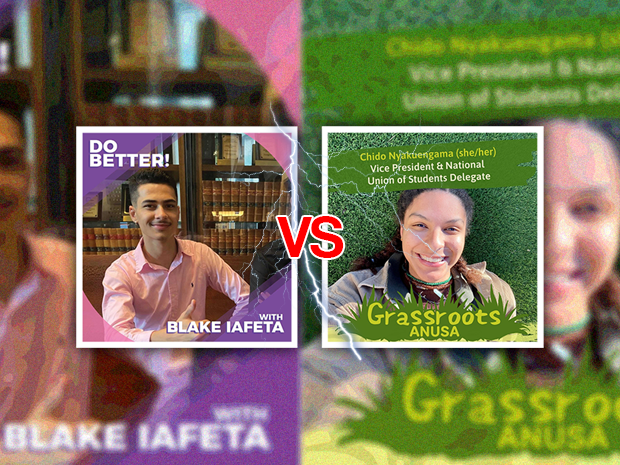Blake Iafeta ALSO Contests VP Against BIPOC Officer Chido Nyakuengama

By Darlene Rowlands
CW: SASH, racism
Two candidates are running for ANUSA Vice President this year. The candidates are Chido Nyakuengama from Grassroots ANUSA, and Blake Iafeta from Do Better! with Blake Iafeta.
The Job
The ANUSA Vice President is involved in coordinating student appeals and focusing on internal education matters such as faculty policies and information services. Together with the President, the Vice President is involved largely in representing and advocating for undergraduate students.
The Candidates
Chido Nyakuengama
Nyakuengama is the current BIPOC Department Officer, where she believes her experience aids her prospective position as Vice President.
The Vice President role requires knowledge of “the different identities, experiences, policies…that exist in all areas of the undergraduate student body”, she said.
She dedicates her platform to engaging students who have experienced a disconnect from ANUSA and its services.
Nyakuengama is also running for NUS Delegate.
Blake Iafeta
Iafeta cites extensive personal experience with marginalisation as the foundation for his candidacy. Iafeta is an ethnic minority, a first-generation university student, a high school dropout from a low-income household, who is additionally disabled and has experienced extreme childhood trauma.
He believes that a first-hand understanding of ANUSA’s current deficiencies in regards to welfare means he can sympathise with students in a similar position, and pledges to advocate for issues directly related to student welfare.
Iafeta is running for 10 additional positions, including ANUSA President.
The Policies
Disabled and disadvantaged accessibility to services
Nyakuengama advocates for the revitalization of BKSS, particularly to redesign the uses of the space with further accessibility in mind.
Since BKSS currently “does very little to accommodate people with different sensory needs”, she aims to address physical features of the space (including “harsh overhead lighting” and a generally “very cold design”) impeding accessibility.
Nyakuengama proposes a rotating calendar to cater to different sensory needs at allotted times, and to administer Sensory Process Awareness training to the BKSS staff.
Iafeta’s accessibility policy focuses on the expansion of mental health and disability services. In addition, his policy also includes providing “essential supplies” to students in need, and expanding ANU’s scholarship portfolio. He intends to work closely with the incoming Disabilities Officer to increase available support for disabled students, and to “streamline and expand” the capacity of ANU Counselling.
Iafeta advocates for an increased volume of scholarships available for mid-year commencing students, and for “students surviving off a low income, and little to no financial support from their families”. He believes the expansion of the scholarship portfolio will assist students struggling to afford essential items, alongside expanding ANUSA’s provision of such items.
Anti-discrimination and SASH
Nyakuengama highlights ANU’s absence of a “clear” anti-discrimination policy as “unacceptable”, establishing a clear process for incidents of discrimination as one of her primary goals.
Nyakuengama also intends to place pressure on relevant bodies to dedicate adequate resources to anti-discrimination incidents, including the possible implementation of an Anti-Racism Unit. She alleges the current system to report racist incidents has left students feeling disrespected and invalidated due to the absence of “consistent regulated consequences” for incidents of discriminations on campus. . She further intends to provide further protection for ANUSA members from anti-discrimination, including streamlining a consistent Safer Spaces policy across all areas on campus.
Iafeta underscores an intent to address SASH incidents, particularly to provide support to survivors “in the form of psychiatric treatment fully paid for by [ANUSA]”. He also intends to “strive for harsher punishments” for the perpetrators of SASH.
Communication with ANUSA
Nyakuengama proposes new methods of communication between ANUSA and undergraduate students. Her goal is to increase the ease of access to communication whilst maintaining safety for marginalised groups. To do this, she intends to implement a new website and app which will include online booking systems for appointments with ANUSA services, an ANUSA-wide calendar, and forms to directly contact Executive and Department Officers. Nyakuengama says the current methods of contacting the Executive are restricted to calling and emailing, with the new system allowing access outside the 9am to 5pm ANUSA operation hours. She further highlights how the current Facebook-dominated landscape for ANUSA discussions is “uncomfortable and unsafe” for some students. To address this issue Nyakuengama has proposed a forum on the ANUSA website and the ability to book consultations with Officers in an attempt to minimise unsafe interactions for such students occurring on Facebook.
Iafeta aims to redirect ANUSA’s focus to issues relating to student welfare, rather than “global issues”. Consequently, he aims to “increase campus culture and encourage intermingling” through the increased provision of events by ANUSA.
Voting for the ANUSA Election will run from 9am, 30 August until 12pm, 2 September.









